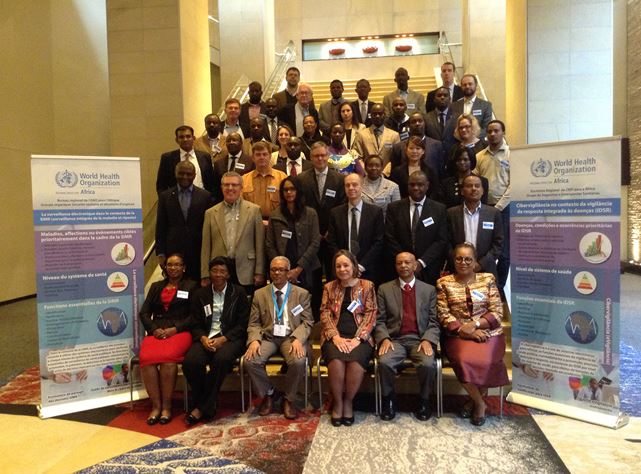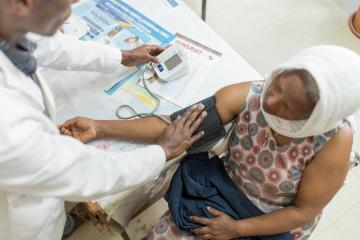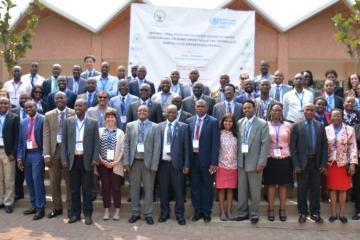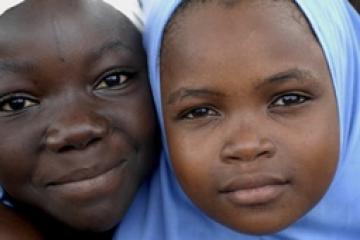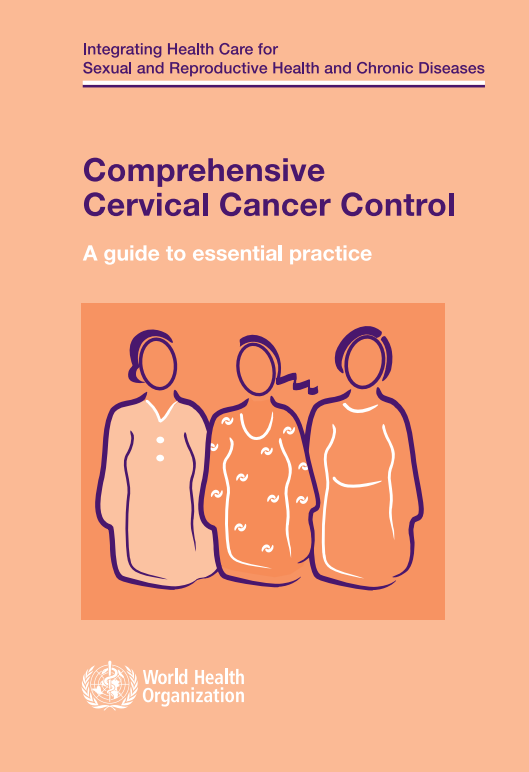
11 October 2016 – A new report from WHO finds that an increase of at least 20% in the retail price of sugary drinks will result in proportional reductions in consumption of sugary drinks. Furthermore, the report also finds that subsidies used to reduce retail prices of fresh fruits and vegetables by 10–30% can increase the consumption of fruit and vegetables.
Brazzaville 12 February 2016 – Cancer control experts from nineteen French-speaking countries in Africa wrapped up a five-day workshop aimed at building their capacity to tackle the rising tide of cancer in the Region.
The workshop which began on 8 February 2016, in Brazzaville, Congo brought together over forty high-level participants from ministries of health. It was organized by the World Health Organization Regional Office for Africa in collaboration with the International Atomic Energy Agency (IAEA), International Agency for Research on Cancer (IARC), African Cancer Registries Network (AFCRN) and the Registre des cancers de Brazzaville. The objective was to enhance Member States’ capacities in establishing and operating cancer registries to support comprehensive cancer control planning in francophone African countries.
Cancer is a real public health problem that kills many people in the African Region. It is estimated that within 20-30 years, the global number of cancer cases is expected to double and African countries will be the most affected. In addition to preventive efforts, effective cancer control requires major Government commitment to the capacity-building of health care professionals and to the provision of adequate facilities.
The investments in cancer treatment, including radiation medicine, can only be optimized if national capacities are enhanced in areas beyond radiotherapy, such as cancer surveillance, prevention, early detection, diagnosis, surgical and medical oncology, and palliative care. Data collected though population-based cancer registries (PBCR) form the basis for sound and sustainable long-term cancer control planning, monitoring and evaluation.
Speaking at the opening session, chaired by the Minister of Higher Education of Congo, Prof Georges Moyen, Dr Joseph Cabore, Director of Programme Management, on behalf of Dr Matshidiso Moeti, the WHO Regional Director for Africa, urged participants to use the skills and knowledge acquired during the workshop to ensure that population-based cancer registries are fully integrated into national cancer control planning. He noted that the aim of cancer registration is not only to know the incidence but also to identify risk factors, and high-risk groups, to better understand the evolution of the disease.
At the end of the workshop, facilitators commended the participants for their high standard contributions and commitment to combating cancer. The participants strengthened their capacity in using cancer registry data for planning and evaluation of cancer control. They were also equipped with cancer registration methods (data collection, data management, basic analysis etc.) as well as tools for reporting on the cancer burden to stakeholders in support of related decision-making. They also familiarized themselves with concepts and methods of cancer registration and how to fully integrate population-based cancer registries into national cancer control planning.
Commenting on the workshop, Dr Ananga Noa Sidone, Consultant Pathologist at Douala General Hospital, Cameroon, said: “We thank the organizers of this meeting for among other things, strengthening our capacities to use data from cancer registries for cancer control planning.We will make good use of this knowledge.”
____________________________________
For more information, please contact:
Dr Jean-Marie Dangou Regional Adviser - Cancer control, dangoujm [at] who.int, Tel +47-241-39344,
C. Boakye-Agyemang, Regional Communications Adviser, boakyeagyemangc [at] who.int, Tel +47-241-39420,
The Commission on Ending Childhood Obesity (ECHO) presented its final report to the WHO Director-General today, culminating a two-year process to address the alarming levels of childhood obesity and overweight globally.
The ECHO report proposes a range of recommendations for governments aimed at reversing the rising trend of children aged under 5 years becoming overweight and obese. At least 41 million children in this age group are obese or overweight, with the greatest rise in the number of children being obese or overweight coming from low- and middle-income countries.
“Increased political commitment is needed to tackle the global challenge of childhood overweight and obesity.”
Sir Peter Gluckman, Commission co-chair
“Increased political commitment is needed to tackle the global challenge of childhood overweight and obesity,” says Sir Peter Gluckman, Commission co-chair. "WHO needs to work with governments to implement a wide range of measures that address the environmental causes of obesity and overweight, and help give children the healthy start to life they deserve."
Fellow Commission co-chair, Dr Sania Nishtar, adds: "Overweight and obesity impact on a child’s quality of life, as they face a wide range of barriers, including physical, psychological and health consequences. We know that obesity can impact on educational attainment too and this, combined with the likelihood that they will remain obese into adulthood, poses major health and economic consequences for them, their families and society as a whole."
"Overweight and obesity impact on a child’s quality of life, and poses major health and economic consequences for them, their families and society as a whole."
Dr Sania Nishtar, Commission co-chair
According to the report, many children are growing up today in environments encouraging weight gain and obesity. Driven by globalization and urbanization, exposure to unhealthy (obesogneic) environments is increasing in high-, middle- and low-income countries and across all socioeconomic groups. The marketing of unhealthy foods and non-alcoholic beverages was identified as a major factor in the increase in numbers of children being overweight and obese, particularly in the developing world.
Overweight prevalence among children aged under 5 years has risen between 1990 and 2014, from 4.8% to 6.1%, with numbers of affected children rising from 31 million to 41 million during that time. The number of overweight children in lower middle-income countries has more than doubled over that period, from 7.5 million to 15.5 million.
In 2014, almost half (48%) of all overweight and obese children aged under 5 lived in Asia and one-quarter (25%) in Africa. The number of overweight children aged under 5 in Africa has nearly doubled since 1990 (5.4 million to 10.3 million).

Promote intake of healthy foods
Implement comprehensive programmes that promote the intake of healthy foods and reduce the intake of unhealthy foods and sugar-sweetened beverages by children and adolescents (through, for example, effective taxation on sugar-sweetened beverages and curbing the marketing of unhealthy foods).

Promote physical activity
Implement comprehensive programmes that promote physical activity and reduce sedentary behaviors in children and adolescents.

Preconception and pregnancy care
Integrate and strengthen guidance for the prevention of noncommunicable diseases (NCDs) with current guidance on preconception and antenatal care (to reduce risk of childhood obesity by preventing low or high birth weight, prematurity and other complications in pregnancy).

Early childhood diet and physical activity
Provide guidance on, and support for, healthy diet, sleep and physical activity in early childhood and promote healthy habits and ensure children grow appropriately and develop healthy habits(by promoting breastfeeding; limiting consumption of foods high in fat, sugar and salt; ensuring availability of healthy foods and physical activity in the early child care settings).

Health, nutrition and physical activity for school-age children
Implement comprehensive programmes that promote healthy school environments, health and nutrition literacy and physical activity among school-age children and adolescents (by establishing standards for school meals; eliminating the sale of unhealthy foods and drinks and; including health and nutrition and quality physical education in the core curriculum);

Weight management
Provide family-based, multi component, lifestyle weight management services for children and young people who are obese.
The ECHO findings urge WHO to institutionalize, throughout the Organization, a cross-cutting and life-course approach to ending childhood obesity. The report also identifies a range of actions to be undertaken by other players, calling for nongovernmental organizations to raise the profile of childhood obesity and advocate for improvements in the environment, and for the private sector to support the production and improved access to foods and beverages that contribute to a healthy diet.



